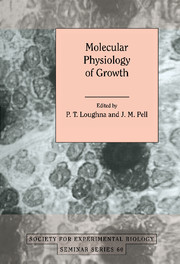Book contents
- Frontmatter
- Contents
- List of contributors
- The role of growth hormone in growth regulation
- Insulin-like growth factor-I and its binding proteins: role in post-natal growth
- Growth factor interactions in epiphyseal chondrogenesis
- Developmental changes in the CNS response to injury: growth factor and matrix interactions
- The role of transforming growth factor β during cardiovascular development
- Tenascin: an extracellular matrix protein associated with bone growth
- Compartmentation of protein synthesis, mRNA targeting and c-myc expression during muscle hypertrophy and growth
- The role of mechanical tension in regulating muscle growth and phenotype
- The pre-natal influence on post-natal muscle growth
- Genomic imprinting and intrauterine growth retardation
- Index
The pre-natal influence on post-natal muscle growth
Published online by Cambridge University Press: 19 January 2010
- Frontmatter
- Contents
- List of contributors
- The role of growth hormone in growth regulation
- Insulin-like growth factor-I and its binding proteins: role in post-natal growth
- Growth factor interactions in epiphyseal chondrogenesis
- Developmental changes in the CNS response to injury: growth factor and matrix interactions
- The role of transforming growth factor β during cardiovascular development
- Tenascin: an extracellular matrix protein associated with bone growth
- Compartmentation of protein synthesis, mRNA targeting and c-myc expression during muscle hypertrophy and growth
- The role of mechanical tension in regulating muscle growth and phenotype
- The pre-natal influence on post-natal muscle growth
- Genomic imprinting and intrauterine growth retardation
- Index
Summary
Summary
Animals with more muscle fibres grow faster and more efficiently than animals with fewer fibres. In mammals, the number of muscle fibres in a given muscle is determined pre-natally. In other words, post-natal growth potential is determined in utero.
We have studied the pre-natal determination of muscle fibre number using nutritional manipulation in pregnant animals. Nutritional restriction throughout gestation in pregnant guinea pigs causes a 20% reduction in fetal muscle fibre number by birth. Maternal and fetal serum levels of IGF-1 are also reduced as is fetal IGF-2. Cortisol is inversely related to IGF-1 levels, but thyroid hormones do not seem to be important until at least late gestation. Maternal undernutrition impairs the expansion of the peripheral labyrinth (exchange surface) of the placenta causing a reduction in placental efficiency in early gestation. More recent work has demonstrated that nutritional restriction in the early stages of gestation only (and then ad lib to birth) is sufficient to reduce muscle fibre number in the offspring. Allied work in the pig has also demonstrated a very early critical stage in gestation when muscle fibre number can be permanently affected as well as IGF-1 levels at birth.
It is suggested that nutritional status very early in gestation can affect post-natal growth performance and that this is mediated through maternal IGFs affecting placental growth. This in turn affects fetal IGFs which influence developing muscle tissue.
Introduction
Muscle mass is determined by muscle fibre number and muscle fibre size.
- Type
- Chapter
- Information
- Molecular Physiology of Growth , pp. 135 - 150Publisher: Cambridge University PressPrint publication year: 1996

